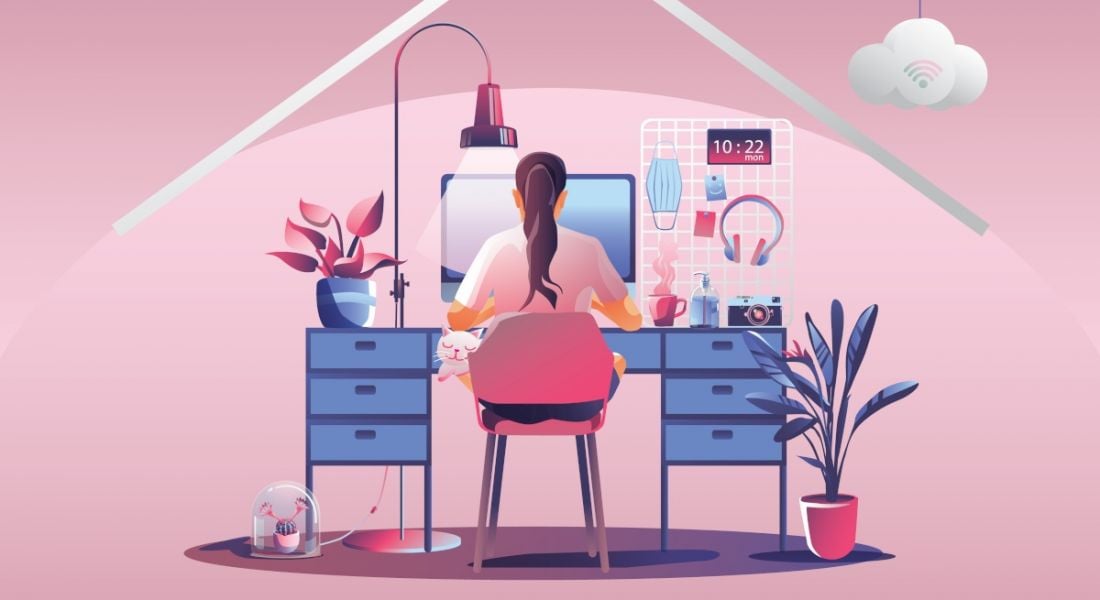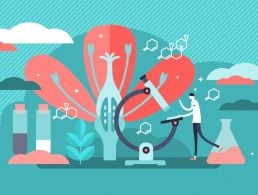To mark one year of working from home, we asked members of the Silicon Republic community to share some of the biggest lessons they’ve learned.
A whole year has gone by since the Government told employees across Ireland to work remotely to help minimise the spread of Covid-19. Now, as it looks like working from home could be here to stay, it’s important that we reflect on what we’ve learned over the past 12 months.
So, we asked some of the people in the Silicon Republic community – people leaders, directors, managers and more – for their thoughts.
1. The importance of staying connected
Alan Diskin, director of technology management at Fidelity Investments Ireland, said he has needed to take some of his own medicine in terms of staying connected over the past year.
“As a manager to a team, and as I hire more technologists to join the team, I’ve been encouraging them to make intentional connections as an active, evolving network is a must when working remotely,” he said.
“Relationships are a powerful source of vitality and a much-needed outlet for some levity in an otherwise virtual workplace. It doesn’t have to be all new relationships, as that can be overwhelming too. But dropping a line to a colleague from a past team and sharing stories and challenges is nothing short of therapeutic and a true source of energy.
“It’s like the vegetables we don’t eat and the exercise we don’t make time for – we know it’s the best thing for us, but it takes an intentional push to make it happen and reap the rewards.”
Rachel Clarke, people business partner at Dun & Bradstreet, added that the need to stay, and feel, connected has been one of the big things for her over the past year.
“The advice I would give to someone is this: go ask about those weekend plans, ask how the new puppy is doing, ask if the house move is going well, ask if the washing machine is fixed yet,” she said. “Simply show someone that they are in your thoughts. These are the conversations that bring us closer together and help us to build real substantial relationships.”
And Accenture Ireland’s managing director for talent and organisation, Tara Levins, shared some of the measures her team has taken to keep those conversations happening.
“We have tried to recreate spontaneous moments of human connection in the virtual world, with initiatives such as Friday coffees, where we randomly connect a group for a coffee and catch-up, or through ‘walk and talks’, where we connect groups to catch up on a Teams chat while walking,” Levins said.
2. How to protect our boundaries
Toeing the line between work and personal time has been harder than ever in the past year now that bedrooms and kitchen tables have been transformed into offices.
Deirdre Sarsfield, Kemp Ireland managing director and VP of marketing, said that one way to deal with this is measuring your day in achieved goals and tasks, rather than hours worked at home. “By setting yourself some clear goals, be it weekly or daily, you won’t become a slave to the laptop. Once you have finished, step away and be present at home.”
And Donal McCarthy, head of innovation for technology at Citi Innovation Labs, agreed. “Early in the Covid-19 crisis, someone remarked to me that we weren’t ‘working from home’ – it felt more like ‘living in work’. This really rang true,” he said.
“I’ve tried to create a very conscious gap between home and work. I also have tried to recreate my normal work rituals such as commuting – going for a short walk around my neighbourhood – and coffee chats with colleagues across the organisation to stay connected.”
Workhuman financial controller Conor Mahony also emphasised the importance of talking to your boss. “Have a good open dialogue with your people leader about your personal circumstances,” he said. “I encourage team members to put time in their schedules to collect the kids from school, check in with homework for those home-schooling and take at least 30 minutes exercise for themselves every one to two days.
“By working closely with your people leader, we will be able to juggle your working from home demands with the team’s workload to be successful.”
3. The value of planning
Something I’ve been reminding myself of throughout the pandemic is that while the global situation is in flux and events seem to be changing daily, I can keep certain aspects of my own life organised.
So, planning ahead is key. PwC’s head of people experience, Rachel Power, said the most important thing she has learned while working from home is planning and managing her calendar.
“If you plan out your day or week ahead of time, you can ensure you make time for and can balance your work priorities, finding time to connect with your team and ensuring you are actively managing your own wellbeing,” she said.
“At PwC Ireland, we operate ‘everyday flexibility’ and, for me, it is this flexibility that is at the heart of making remote working a success. It’s a fluid concept and encourages us all to embrace agile flexible working practices that can boost productivity and wellbeing.”
‘By setting yourself some clear goals, you won’t become a slave to the laptop’
– DEIRDRE SARSFIELD, KEMP
Employing the help of online tools can help you with the planning process. For Abby Langtry, director of patient advocacy and community engagement at Genuity Science, setting a pomodoro timer has been a crucial part of her day.
“In the office, there are always distractions and interruptions,” she said. “At home, there may not be quite so many; no one is popping over to your desk or asking you a quick question from their seat. What I wouldn’t give for a few interruptions now! Working from home uninterrupted might mean sitting at your desk for hours without a break.
“The pomodoro technique is a time-management method developed in the late 1980s. The technique uses a timer to break down work into intervals, traditionally 25 minutes in length, separated by short breaks.”
4. Why we need to actively listen
From a leadership perspective, Clarke said that understanding the needs of teams at Dun & Bradstreet has been crucial in creating an environment for growth and allowing employees voices to be heard during a time of great upheaval.
“One thing we noticed as we all began to switch to remote working over a year ago was that the employee voice, or the ability to hear to it, became a little bit more challenging. And we knew that we were not alone!
“Those connections were what led to invaluable insights and made us feel like we were all part of one big team.”
You should also remember to thank your colleagues or recognise their work from time to time, Mahony said. “Whether you’re a people leader or individual contributor, make sure to take the time and say thank you to your colleagues. Workhuman’s recent One Year Into Covid report found that 31pc of employees say recognition directly impacts their motivation to succeed, and nearly one-quarter say it increases their productivity levels during the pandemic.”
McCarthy of Citi added that everyone is experiencing this pandemic differently. “But, as a team, we’ll get through it together and be stronger after it passes,” he said. “Lead with empathy; you never know how someone is struggling or what personal situation they have going on.”
5. How to prioritise our wellbeing
Yvonne Jacobi, COO of the Aon Centre for Innovation and Analytics, emphasised that wellbeing should be front and centre at the moment. “Aon’s focus has and will continue to be on our colleagues’ wellbeing and health, to ensure our teams have the support required to thrive, delivering the best for our clients, and ultimately achieving the balance we all strive for.”
Investing in your employees’ wellbeing can range from establishing meeting etiquette to providing online yoga classes, giving extra holidays, or adopting an “open door policy” with company leaders.
“But really, what becomes clear is that there’s not just one tip,” she said. “It’s a jigsaw of multiple pieces which make for successful remote working.”




